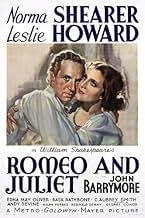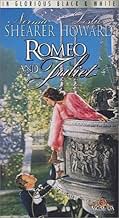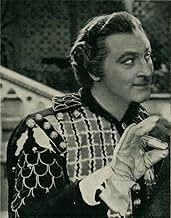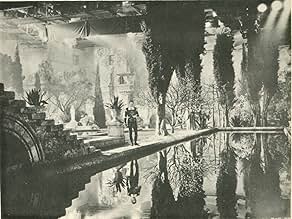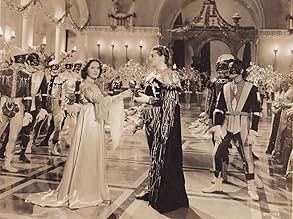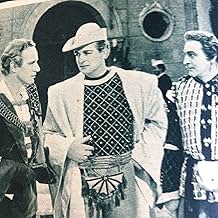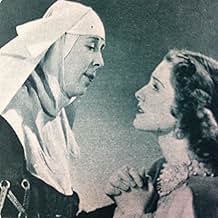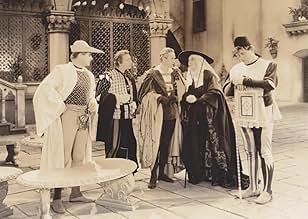NOTE IMDb
6,5/10
2,4 k
MA NOTE
Ajouter une intrigue dans votre langueYoung love is poisoned by a generations long feud between two noble families.Young love is poisoned by a generations long feud between two noble families.Young love is poisoned by a generations long feud between two noble families.
- Réalisation
- Scénario
- Casting principal
- Nommé pour 4 Oscars
- 4 victoires et 5 nominations au total
Charles Bancroft
- Nobleman
- (non crédité)
Dean Benton
- Minor Secondary Role
- (non crédité)
Carlyle Blackwell Jr.
- Tybalt's Page
- (non crédité)
John Bryan
- Friar John
- (non crédité)
Avis à la une
While I was looking for new materials to help teach "Romeo and Juliet," I found the 1936 version of the play and naturally I was intrigued. I'm assuming that most people know the basic plot and have seen other versions of the film, if this is not the case you may want to stop reading and keep the surprise for viewing.
This version is faithful if not to the exact order of all the dialogue then to the acts and scenes written by Shakespeare. For those teachers that are looking for a version that explains how the letter from Friar Lawrence never reaches Romeo and the reaction of the local populace to "Plague," this is the version that does it very well. Not only do we learn why Friar John never gets to Romeo but we also get the death duel between Romeo and Paris, a scene that has been cut out of every other version I've seen. Plus we get the closing moment of peace between the families. However, the death of Lady Montague is omitted.
The movie leaves a little to be desired by modern audiences and the typical class of high school freshman many need some heavy prep work to get them ready to view "black and white" and "old" as something other than "lame." But, I think that segments of the film would be well worth showing to the class and viewed as a treat and not a torture when it's not the whole product being shoved down in one lump.
I recommend checking it out as an additional resource to add a balanced movie perspective to the characters Shakespeare created. The main problem with it is the age of the actors playing the parts of all these young people. Leslie Howard is 40 years old. Norma Shearer must be of a similar age and it shows in some of the scenes. The age of the people supposedly playing teenagers does strain credibility and at times the acting leaves a lot to be desired. They don't convincingly play "passion." You can chalk the overall feeling of muted emotion to the era because at times the emotions do come through brilliantly.
This version is faithful if not to the exact order of all the dialogue then to the acts and scenes written by Shakespeare. For those teachers that are looking for a version that explains how the letter from Friar Lawrence never reaches Romeo and the reaction of the local populace to "Plague," this is the version that does it very well. Not only do we learn why Friar John never gets to Romeo but we also get the death duel between Romeo and Paris, a scene that has been cut out of every other version I've seen. Plus we get the closing moment of peace between the families. However, the death of Lady Montague is omitted.
The movie leaves a little to be desired by modern audiences and the typical class of high school freshman many need some heavy prep work to get them ready to view "black and white" and "old" as something other than "lame." But, I think that segments of the film would be well worth showing to the class and viewed as a treat and not a torture when it's not the whole product being shoved down in one lump.
I recommend checking it out as an additional resource to add a balanced movie perspective to the characters Shakespeare created. The main problem with it is the age of the actors playing the parts of all these young people. Leslie Howard is 40 years old. Norma Shearer must be of a similar age and it shows in some of the scenes. The age of the people supposedly playing teenagers does strain credibility and at times the acting leaves a lot to be desired. They don't convincingly play "passion." You can chalk the overall feeling of muted emotion to the era because at times the emotions do come through brilliantly.
Unlike so many of the other commentators below, I am not a fan of Ms. Shearer. In her opening scene, she gushily keeps herself wide-eyed and smiling--all the time acting innocent, while Olivia Hussey and other screen Juliets don't have to act innocent: they are innocent.
That said, this film has much to offer, despite its lacking the passion of other more recent versions. The verse is spoken well, and Barrymore is brilliant as Mercutio. Yes, he's pure ham---but a succulent one. His Mercutio is, as the character's name implies, mercurial as well as absurdist, ironic, and virile. Rathbone is like a living rapier and gets my vote as the best Tybalt the screen has ever seen. However, don't believe producer Thalberg's ballyhoo that every word spoken in this film is from Shakespeare's play: it isn't, although it's close.
That said, this film has much to offer, despite its lacking the passion of other more recent versions. The verse is spoken well, and Barrymore is brilliant as Mercutio. Yes, he's pure ham---but a succulent one. His Mercutio is, as the character's name implies, mercurial as well as absurdist, ironic, and virile. Rathbone is like a living rapier and gets my vote as the best Tybalt the screen has ever seen. However, don't believe producer Thalberg's ballyhoo that every word spoken in this film is from Shakespeare's play: it isn't, although it's close.
For years, I put off watching this version of Shakespeare's classic love story, knowing that all the main players were about thirty years too old for their roles. Finally, when the film came on late on night, I decided to take a look, because I do admire the work of so many of the players.
Provided you can put aside the problems of the ages of the actors, the result is a very pleasant surprise. The biggest surprise for me was the performance of Norma Shearer - I've always liked her work, but considered her rather lightweight for Shakespeare. Not so - she delivered her lines with a great feel for the style and pace, and was as delightful and open a Juliet as one could wish. Her age became irrelevant; this was a young girl new to love, completely swept off her feet and ready to surrender all - for the first time.
Leslie Howard was also comfortable with the Shakespearean dialogue, if slightly lacking the boyish passion we rightly expect to see. He was more the slightly older suitor, taken by surprise with the fresh appeal of his Juliet, but ready to cast aside previous attachments to pursue and win her. His lovely voice delivered the lines with ease and fluency.
John Barrymore's Mercutio was much more the ageing playboy than the dashing young blade, but his sure touch with the dialogue showed clearly why he was considered the preeminent Shakespearean actor of his day in America. His delivery of the "Queen Mab" speech was a delight. His body was way too old, but his spirit lacked nothing.
Flora Robson came near to stealing most of her scenes, as she so often did, and Basil Rathbone was fully at home in the role of Tybalt; fine performances from these two, as we would expect from their backgrounds.
It was, to my mind, rather over-produced, with the actors in danger of being lost in the expansive sets, but remembering that had these actors been performing on stage, we wouldn't bat an eyelid at their ages, they provide us with an engrossing experience and deliver a play that even the experts couldn't fault.
Provided you can put aside the problems of the ages of the actors, the result is a very pleasant surprise. The biggest surprise for me was the performance of Norma Shearer - I've always liked her work, but considered her rather lightweight for Shakespeare. Not so - she delivered her lines with a great feel for the style and pace, and was as delightful and open a Juliet as one could wish. Her age became irrelevant; this was a young girl new to love, completely swept off her feet and ready to surrender all - for the first time.
Leslie Howard was also comfortable with the Shakespearean dialogue, if slightly lacking the boyish passion we rightly expect to see. He was more the slightly older suitor, taken by surprise with the fresh appeal of his Juliet, but ready to cast aside previous attachments to pursue and win her. His lovely voice delivered the lines with ease and fluency.
John Barrymore's Mercutio was much more the ageing playboy than the dashing young blade, but his sure touch with the dialogue showed clearly why he was considered the preeminent Shakespearean actor of his day in America. His delivery of the "Queen Mab" speech was a delight. His body was way too old, but his spirit lacked nothing.
Flora Robson came near to stealing most of her scenes, as she so often did, and Basil Rathbone was fully at home in the role of Tybalt; fine performances from these two, as we would expect from their backgrounds.
It was, to my mind, rather over-produced, with the actors in danger of being lost in the expansive sets, but remembering that had these actors been performing on stage, we wouldn't bat an eyelid at their ages, they provide us with an engrossing experience and deliver a play that even the experts couldn't fault.
The fine cast and production make this adaptation of "Romeo & Juliet" a satisfying one, both as a movie and as a realization of Shakespeare's play. Most of the cast is matched up very well with their characters, and the lavish settings provide a good backdrop for the drama.
Although it's soon clear that Leslie Howard and Norma Shearer are quite a bit older than the original characters were, in other respects they are well cast. Shearer's eager innocence and Howard's refinement fit together well, and although they are clearly not the teenage characters of the original, their romance is believable and convincing in itself.
The other roles include some nice casting. Reginald Denny as the loyal Benvolio, Basil Rathbone as the hard-hearted Tybalt, and Edna May Oliver as Juliet's bustling nurse are all enjoyable to watch. But the highlight of the cast is John Barrymore, who steals every scene as the fun-loving, ill-fated Mercutio, a character who is well-suited to Barrymore's strengths. It's a blessing that at least one of Barrymore's numerous Shakespearean roles was captured in a film for posterity.
The script abridges many of the scenes for cinematic purposes, and it does well in fleshing out the basic story with the duels, festivities, and other events, at times also dramatizing developments that in the original text are only mentioned by the characters. Overall, it is a well-conceived, well-executed, and enjoyable movie version of the famous story.
Although it's soon clear that Leslie Howard and Norma Shearer are quite a bit older than the original characters were, in other respects they are well cast. Shearer's eager innocence and Howard's refinement fit together well, and although they are clearly not the teenage characters of the original, their romance is believable and convincing in itself.
The other roles include some nice casting. Reginald Denny as the loyal Benvolio, Basil Rathbone as the hard-hearted Tybalt, and Edna May Oliver as Juliet's bustling nurse are all enjoyable to watch. But the highlight of the cast is John Barrymore, who steals every scene as the fun-loving, ill-fated Mercutio, a character who is well-suited to Barrymore's strengths. It's a blessing that at least one of Barrymore's numerous Shakespearean roles was captured in a film for posterity.
The script abridges many of the scenes for cinematic purposes, and it does well in fleshing out the basic story with the duels, festivities, and other events, at times also dramatizing developments that in the original text are only mentioned by the characters. Overall, it is a well-conceived, well-executed, and enjoyable movie version of the famous story.
The Adrian (and Messell) costumes are magnificent. The sets & cinematography are beautifully realized & director George Cukor does the best he can with what he has been given but the absurd casting of actors 20 years, or more, too old cannot be ignored. Juliet is supposed to be around 13 & Norma Shearer is in her mid 30s. Romeo is to be approximately 16. Leslie Howard is in his mid 40s. The foolish, romantic & tragic path taken by Romeo & Juliet is because of their youth. With these 2 way too old actors, it makes the characters behave as if they are developmentally challenged. It is not how adults behave. I'm am not a student of Shakespeare but I've read the play. Many necessary cuts were made to the text in order to get it to the screen or it would've ended up being over 4 hours long. I don't complain of these cuts. I don't complain of the line readings by some actors. I respect how the studio & Thalberg put the money & attention to detail into the production. Accomplished Shakespearean acting coaches were brought in to get the best performances from the actors. I believe Norma Shearer worked hard to do her best but oh my. She is not Juliet. Leslie Howard is ok but both wouldve been better cast as Lord and Lady Montague or Lord and Lady Capulet. It is a lush & lavish production. I can admire it as a beautiful elegant bauble. If I don't pay close attention to the actors, I can enjoy the spectacle but I cannot accept Shearer & Howard as the lead characters. It's a distraction I cannot pretend isn't there. That they are too old is a valid reason to critique the movie harshly.
Le saviez-vous
- AnecdotesThe film contains the only on-screen sword fight that expert swordsman Basil Rathbone won in his entire film career.
- Citations
Juliet - Daughter to Capulet: My bounty is as boundless as the sea, My love as deep. The more I give to thee, The more I have, for both are infinite.
- ConnexionsFeatured in Maître Will (1936)
Meilleurs choix
Connectez-vous pour évaluer et suivre la liste de favoris afin de recevoir des recommandations personnalisées
- How long is Romeo and Juliet?Alimenté par Alexa
Détails
- Date de sortie
- Pays d’origine
- Site officiel
- Langue
- Aussi connu sous le nom de
- Romeo and Juliet
- Lieux de tournage
- Société de production
- Voir plus de crédits d'entreprise sur IMDbPro
- Durée2 heures 5 minutes
- Couleur
- Rapport de forme
- 1.37 : 1
Contribuer à cette page
Suggérer une modification ou ajouter du contenu manquant

Lacune principale
By what name was Roméo et Juliette (1936) officially released in India in English?
Répondre

